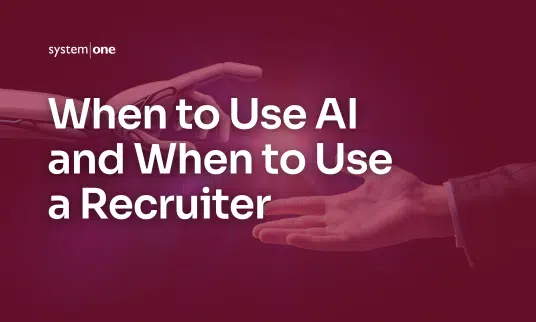The Real Interview Process

Everything You Want to Know About Interviewing
Being in recruiting for over 40 years, we’ve answered pretty much every question a candidate could have about the interview process – and now we’re sharing our knowledge. Let’s jump right in!
What is the process usually like with a recruiter?
 So you applied to one of our jobs or a recruiter found your resume online and contacted you for a position. Awesome!
So you applied to one of our jobs or a recruiter found your resume online and contacted you for a position. Awesome!
“When you’re dealing with a recruiter, you can expect an initial phone call so that we can tell you about the position and gauge your interest,” says Tony Webster, Recruiter at System One. “We’ll also ask you questions about your work experience and skills, we’ll make sure we have your latest resume, and if you’re interested in the position, we’ll send you the official job description and talk in more detail about the client. Once you confirm it’s ok to submit you to the client, we do so, and then wait to hear back if they want to interview you. It’s a couple more steps than if you had applied to a job yourself, but we have access to jobs you wouldn’t be able to find elsewhere, and we’re in your corner, acting as your cover letter and support team. Working with a recruiter can give you an edge over other applicants that you otherwise wouldn’t have.”
What kind of research should I do?
You’ll want to do a bunch of research on the company, the products and/or services, and the people in charge. Things like the mission and vision statements, when the company was founded, how much growth they’ve seen, who the founders are, who the current CEO is, and what products and/or services they sell – especially their core/flagship product or service. In fact, you should be so educated on that product or service that you can talk about it intelligently. Bonus points if you give them a genuine compliment on one of its features.
How many interviews should I expect? What’s normal?
Generally speaking, you might do a phone screening, a phone interview (though not every company does this), and lastly, in-person interviews. We pluralized that because it’s usually not just one. You might meet with HR first, then a supervisor, then a manager. Some smaller companies also like having a teammate interview you, while others are even more rigorous and get a C-level executive to conduct your final interview. In short: it depends, but expect at least 3 interviews.
Should I bring copies of my resume?
Absolutely. I once showed up to a company for my first in-person interview. My interviewer, let’s call her Susan, unfortunately got dragged into a last-minute meeting and was unable to attend. She got someone else to interview me, but she forgot to send my resume over to her replacement… and I came empty-handed. That’s right: neither of us had my resume to look at. It was an awful, awkward interview that ended up lasting only 10 minutes.
Learn from my mistake. Always, always bring multiple copies of your resume. You never know what bad luck could be bestowed upon you, so be prepared. Bring 5 copies with you, just in case other people decide to tag along.
What can I do to calm my nerves?
 The best thing to do if you’re nervous during interviews – and this is tired advice, but that’s because it works – is breathe. Just keep breathing. Deep breathing is known to calm nerves, reduce anxiety, and bring you into the present moment. If you feel your mind racing or if you notice you’re starting to speak more quickly, take a moment: when it’s the interviewer’s time to speak, take a few deep, quiet breaths to center yourself.
The best thing to do if you’re nervous during interviews – and this is tired advice, but that’s because it works – is breathe. Just keep breathing. Deep breathing is known to calm nerves, reduce anxiety, and bring you into the present moment. If you feel your mind racing or if you notice you’re starting to speak more quickly, take a moment: when it’s the interviewer’s time to speak, take a few deep, quiet breaths to center yourself.
Otherwise, try to remember that this is just an interview. It’s just a conversation. You’re just two people talking about your experience and your skills. Remember that you have just as much power as them: ultimately, you make the decision if you want to work there or not. So gather up your confidence, breathe, and go.
How can I answer why I want this job, without it being "because I need money to survive?"
We all know the joke: “Why do you want this job?” “I’ve always been passionate about not starving to death.”
All jokes aside, yes, interviewers know you want this job because it provides currency. What they’re looking for is an answer about the company. Why do you want to work for Pug Sweater Knitters, LLC? Because you love the company’s mission to keep pugs warm during the winter. Because the product is something you believe in. Because the company has a great culture and the CEO has done a fantastic job keeping their vision alive through the growth they’ve seen in the past two years (you know this because you did your research). Because they have a strong presence in the industry and your skills would be able to bring a whole other dimension to knitting sweaters for pugs. Make it about the company and what you can do for it – not what it can do for you.
Why is it important to ask my interviewer some questions?
Interviews are a two-way street. As much as they’re testing you to see if you’re a good fit for the company, you should be testing them to see if they’re a good fit for you. Not asking questions basically tells the interviewer that you don’t really care about being part of the company – it shows a profound lack of interest, and quite frankly, can come off as disrespectful.
Ask them about the culture, why they like working there, if their core/flagship product or service has any updates coming soon, have they thought about implementing X feature, etc. Show interest. Show excitement. Ask questions.
What can I do if my interviewer looks really bored, is on their computer, or starts texting?
Yes, it happens. Yes, it’s rude and distracting. And yes, it might even be a sign of poor time management or being completely overworked. Either way, not a good look on the company – but also, not worth burning bridges. Do nothing. Don’t call attention to it. Stay polite, finish out the interview, and on your drive home, reassess if you want to work for a company that can’t give you their undivided attention for less than an hour.
What if, mid-interview, I realize this isn't the right job for me?
 Your instinct might be to cut the interview short, but we’d advise against that. Finish out the interview, remain polite and friendly, and don’t burn bridges.
Your instinct might be to cut the interview short, but we’d advise against that. Finish out the interview, remain polite and friendly, and don’t burn bridges.
Do you like the company itself? Is it just the job that’s not right? If that’s the case, it’s ok to be honest with your interviewer. Let them know you’d love to be part of Pug Sweater Knitters, LLC, but you feel your skills would more closely match a position in sweater design, not knitting. See where the conversation goes, and if they unfortunately don’t have other positions that you would be a fit for, sincerely thank them for their time, smile, shake their hand, and stay in touch via LinkedIn. You never know what making a good impression and being honest could lead to – even if it’s not at that company. Maybe your interviewer has a connection at Cat Scarves, Inc. they could introduce you to.
How can I find out about the company's culture?
- Scour the company’s social media pages. Oftentimes, companies will have separate ‘people’ accounts for showcasing company events and culture.
- Find a couple people that work at the company and ask them for an informational interview.
- Read articles about them.
- Look into their philanthropic efforts.
Get creative – there are so many ways to find out about a company’s culture without having to step into it. We're writing an article on that too, so tune back in for more info!
--
Have another burning interview question? Message us at marketing@systemone.com and we’ll add it to this list!
About System One
System One delivers specialized workforce solutions and integrated services. We help clients get work done more efficiently and economically, without compromising quality. For more than 40 years, we’ve built our reputation on exceptional talent, flexible delivery, and full accountability. System One’s national network spans energy, engineering, IT, commercial, scientific & clinical, legal, marketing, and beyond. System One is based in Pittsburgh, PA.
Looking for business solutions?
Explore System One

